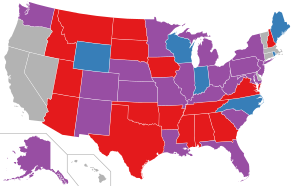
Since 2020, efforts have been made by conservatives and others to challenge critical race theory (CRT) being taught in schools in the United States. Following the 2020 protests of the murders of Ahmaud Arbery and George Floyd, as well as the killing of Breonna Taylor, school districts began to introduce additional curricula and create diversity, equity, and inclusion (DEI)-positions to address "disparities stemming from race, economics, disabilities and other factors".[1] These measures were met with criticism from conservatives, particularly those in the Republican Party. Political scientist Jennifer Victor of George Mason University has described this as part of a cycle of backlash against progress toward racial equality and equity.[2]
Outspoken critics of critical race theory include U.S. president Donald Trump, conservative activist Christopher Rufo, various Republican officials, and conservative commentators on Fox News and right-wing talk radio shows.[3] Movements have arisen from the controversy; in particular, the No Left Turn in Education movement, which has been described as one of the largest groups targeting school boards regarding critical race theory. In response to the assertion that CRT was being taught in public schools, dozens of states have introduced bills that limit what schools can teach regarding race, American history, politics, and gender.[4]
